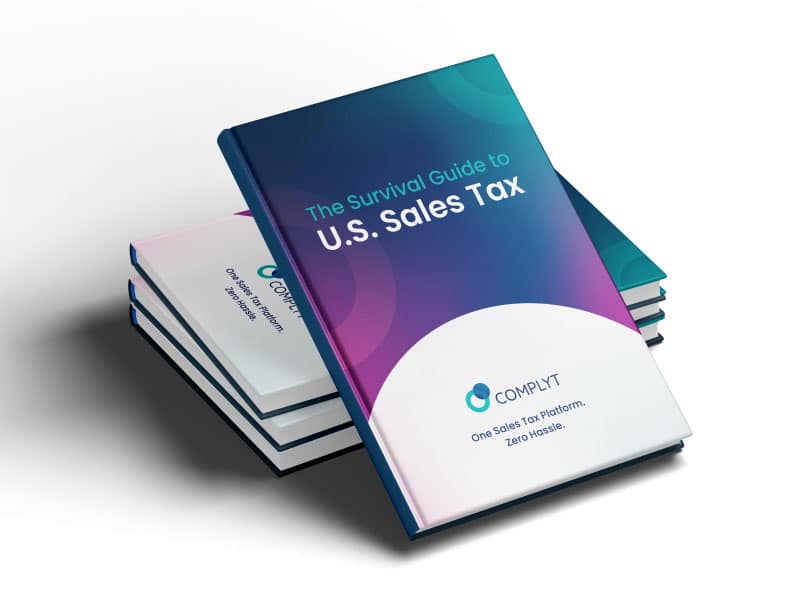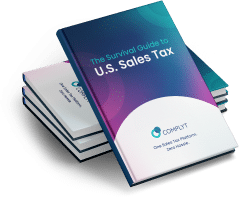What is the sales tax rate in Wisconsin?
In Wisconsin, the state sales tax rate is 5%, but counties and municipalities can levy additional taxes, bringing the total sales tax rate to as high as 5.6%.
These local sales taxes are added to the state rate and applied to the same taxable sales and purchases. If you operate a business in Wisconsin, it is crucial to understand the sales tax rate applicable in your specific location.
When should your business collect Sales Tax in Wisconsin?
Businesses need to collect sales tax once they have a physical presence (nexus) in the state or surpass its economic nexus thresholds.
And while those two requirements sound simple enough, they can be downright tricky to monitor effectively.
Wisconsin Physical Sales Tax Nexus
Having a physical presence or nexus in Wisconsin means you’re required to collect and remit sales tax. But which factors can establish a physical nexus?
Sales Tax Physical Nexus checklist for Wisconsin
Use this checklist to determine if your business has a physical sales tax nexus in Wisconsin:
- Do you have a business location, office, or warehouse in Wisconsin?
- Do you have employees, representatives, or salespeople in the state?
- Do you store inventory in Wisconsin?
- Do you provide services within the state?
- Have you attended events, trade shows, or craft fairs in Wisconsin?
If you answer “yes” to any of these questions, your business likely has a physical nexus in Wisconsin and must collect and remit sales tax.
Wisconsin Economic Nexus Threshold: Revenue, Thresholds, and Transactions
In addition to physical nexus, Wisconsin has economic nexus rules for remote sellers. Businesses with no physical presence in the state may still need to collect sales tax if they exceed the economic nexus thresholds.
Wisconsin economic nexus thresholds are a gross revenue from sales into Wisconsin exceeding $100,000 or 200 or more separate transactions in the state.
If your business exceeds either of these thresholds in the previous or current calendar year, you must register, collect, and remit Wisconsin sales tax.
Which services are taxable in Wisconsin?
In Wisconsin, many services are subject to sales tax. However, certain services are specifically exempt from sales tax. It’s essential to determine whether the services you provide are taxable or not.
Here are some common taxable services in Wisconsin:
- Repair and maintenance services
- Telecommunication services
- Landscaping and lawn maintenance services
- Laundry and dry-cleaning services
- Professional, scientific, and technical services
- Personal care services (e.g., haircuts, manicures)
Please note that this list is not exhaustive, and some exceptions may apply.
Wisconsin Sales Tax on Products: How to Calculate What Your Business Should be Charging
Calculating the sales tax in Wisconsin involves considering both the state rate and any local rates. If you’re selling products or taxable services in different Wisconsin locations, your tax rate may differ due to local sales taxes. Here’s how to calculate your tax charge:
Identify your nexus in Wisconsin. If you have a physical presence or surpass economic nexus thresholds, you’ll likely need to collect sales tax.
Determine the product’s taxability. If you’re selling tangible personal property or taxable services, sales tax applies.
Find the total sales tax rate. Add the state rate (5%) to any local rates (up to 0.6%).
Apply the rate to the sale price. Multiply the total tax rate by the sales price of your product or service.
Keep records. Document your transactions, tax rates, and collected tax for accurate sales tax filing.
How much is the Wisconsin clothing tax?
In Wisconsin, the state sales tax rate is 5%, and there may be additional local sales taxes that apply to the sale of clothing. However, some clothing items are exempt from sales tax, such as prescription safety equipment and some cold weather gear.
Wisconsin Online Sales Tax: Are SaaS and Digital Services Taxable?
In Wisconsin, a number of digital goods and digital services are taxable if delivered electronically and used in the state. However, some exceptions might apply, such as if the service is for resale or used outside Wisconsin.
SaaS Sales Tax Wisconsin: Is SaaS also taxable in Wisconsin?
While many other digital products and services are taxable in Wisconsin, SaaS is not yet subject to sales tax in Wisconsin. So for the time being, Wisconsin SaaS Sales Tax is not yet a compliance concern.
How can a business get a sales tax permit in Wisconsin?
To collect sales tax in Wisconsin, businesses must first obtain a Seller’s Permit from the Wisconsin Department of Revenue. You can apply online through the department’s My Tax Account portal or submit a paper application (Form BTR-101). The process requires:
- Business information (name, address, contact details)
- Business structure (sole proprietor, partnership, corporation, etc.)
- Federal Employer Identification Number (FEIN) or Social Security Number (SSN)
- Business activity details (products/services sold, locations)
- Estimated monthly sales tax liability
Once approved, the department will issue your Seller’s Permit and assign a tax return filing frequency.
Collecting Sales Tax in Wisconsin as a Business
As a business owner, it’s crucial to understand your sales tax collection obligations in Wisconsin.
Wisconsin Tax Return Due Dates Explained
Wisconsin sales tax returns are typically due on the last day of the month following the reporting period. The filing frequency depends on your sales tax liability:
- Monthly: Due by the end of the following month.
- Quarterly: Due by the last day of the month following the quarter.
- Annually: Due by January 31 of the following year.
What is the required frequency for sales tax returns in Wisconsin?
Your filing frequency depends on your sales tax liability:
- Over $1,200/month: Monthly
- $600 to $1,200/month: Quarterly
- Under $600/month: Annually
The Department of Revenue may adjust your frequency based on your actual tax collections.

